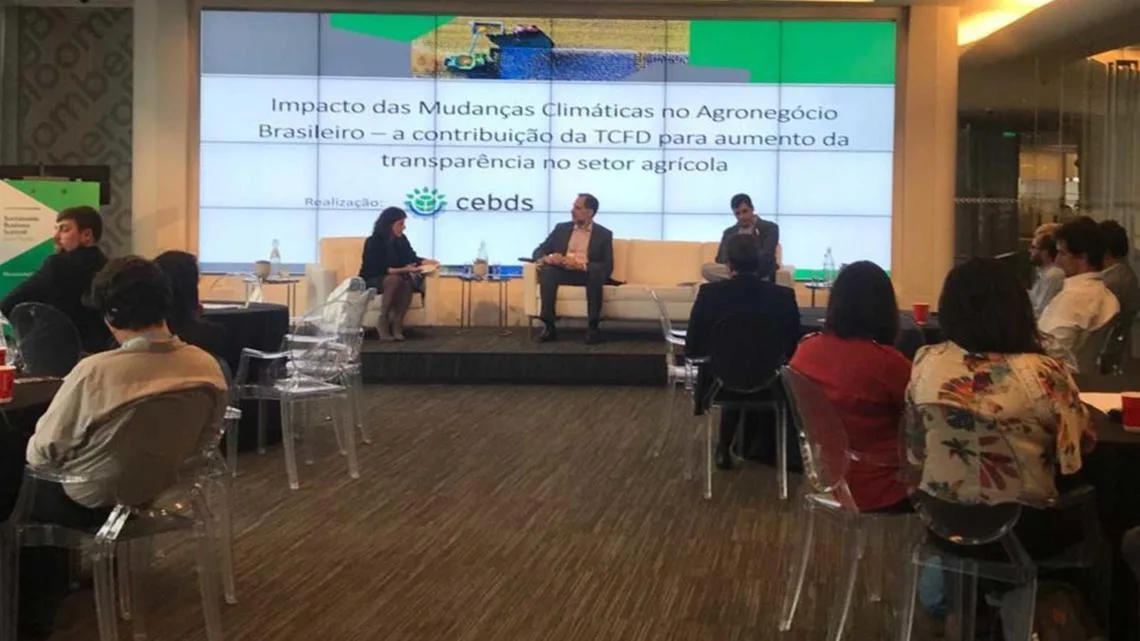Geneva, 14 May 2019: The Brazilian Business Council for Sustainable Development (CEBDS), part of WBCSD’s Global Network of partner organizations, recently embarked on a series of discussions and workshops to increase companies’ understanding of transparency and risk management challenges, opportunities and solutions.
The latest of these engagements took place on the sidelines of the Bloomberg Sustainable Business Summit held on 24-26 April in São Paulo.
CEBDS, Bloomberg and WBCSD convened a dialogue for Brazilian agribusinesses exploring climate-related impacts, as well as challenges and opportunities associated with implementing the recommendations of the Task Force on Climate-related Financial Disclosures (TCFD).
Key themes that emerged across the discussions centered around finance and resilience, that is, how to communicate and finance innovative solutions, and how companies – particularly agribusinesses – can and should prepare, adapt and respond to climate change.
In a hands-on risk management training the following day, WBCSD members – Bayer, Natura, Santander, BNP Paribas, Schneider Electric and Votorantim Cimentos in particular – shared how environmental, social and governance (ESG) risk and opportunity management can be integrated into business strategy, performance management and disclosures.
One of the key ways for companies to make a start on this front is with the Guidance for Applying Enterprise Risk Management (ERM) to ESG-related Risks. The Guidance was developed by the Committee of Sponsoring Organizations of the Treadway Commission (COSO) and WBCSD to help organizations worldwide respond to the increasing prevalence and severity of ESG-related risks, ranging from extreme weather events to product safety recalls.
The application of the Guidance highlights the importance of considering ESG challenges at an enterprise level using COSO’s updated framework. Furthermore, it offers an opportunity for businesses to expand their understanding of the risk profile and the value creation model – while enabling them to consider how these issues impact shareholders and society. This is one of the main frameworks businesses can use to start integrating sustainability in a systematic way.
The Bloomberg Summit brought together executives, investors and innovative thought leaders for critical conversations about local and global issues in sustainable business and finance, including: long-term growth, inequality, the Sustainable Development Goals, climate change, the circular economy, transparency and public/private collaboration.
WBCSD members including Syngenta, Santander and Natura were present and active, presenting their perspectives, insights and key learnings on the importance of the topics for their business operations.
The Summit drove home the point that leading businesses are integrating ESG risks, opportunities, impacts and dependencies into decision-making and telling key stakeholders what they are doing in a strategic way.
As José Antonio Filippo, Chief Financial Officer of Natura, put it: “Is sustainability a cost? Absolutely not – it is integrated in our processes… investors and customers are very interested.”
CEBDS and WBCSD will continue to engage businesses in Brazil in beyond to measure and manage risk, gain competitive advantage and seize new opportunities by understanding ESG information.
More information
- Luke Blower, Associate, Redefining Value, WBCSD
- Ana Carolina Avzaradel Szklo, Institutional Development Director, CEBDS

